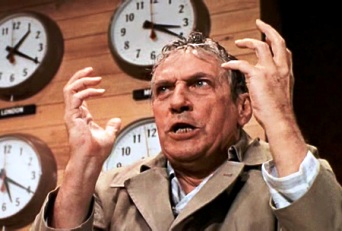There’s a signature moment in the 1976 film Network in which a drunk and dispirited Howard Beale who – after losing his news anchor job – abandons his script, looks straight into the camera and, in an astounding bit of prescience, begins his sermon from the mount.

“I don’t have to tell you things are bad. Everybody knows things are bad. …It’s like everything, everywhere is going crazy.”
After ten minutes, Beale’s call-to-arms-Tea-Party moment comes.
“I want you to get up now… go to the window, open it, stick your head out, and yell, ‘I’M AS MAD AS HELL, AND I’M NOT GOING TO TAKE THIS ANYMORE!‘”
Flash forward – 2010.
I don’t have to tell you that people are angry. We all know people are angry.
They’re angry at an economy that continues to struggle. They’re angry at a decline in jobs, declining housing, rising deficits, Wall Street, banks, two wars, government bailouts. They’re angry at the news media, large corporations, entertainment industry, labor unions, federal agencies, Republicans, Democrats, Congress – according to the latest Pew Research poll, they’re REALLY angry at Congress.
The Tea Party movement’s entire theme is structured around anger. But that’s not what people are really angry about.
They’re really angry at all the fraud, deceit, lying, cheating, misleading, misdirecting, misinforming, irresponsible, unaccountable, unjust, excessive, me-first, everybody-does-it, end-justifies-the-means, in-your-face lack of integrity. This is what Americans are really angry about. And that’s what’s driving much of the self-branded Tea Party.
However, the same thing that gives the Tea Party Patriots a level of political credibility is the same thing that causes them to be angry – like when Republican Congresswoman Michelle Bachmann spoke at a recent rally saying, “We’re on to this gangster government.”
“Gangster government, Congresswoman?” David Gregory asked Representative Marsha Blackburn last Sunday on Meet the Press. “Are those views that you would stand behind?”
“You know,” Blackburn said, “I choose a different rhetoric…”
“Wait, but one second,” Gregory interrupts, “is that over the line?”
Gregory asks Blackburn that question three times and each time she avoids saying the obvious, the one thing that most Americans want to hear: “YES, it was over the line and YES, elected leaders shouldn’t be talking like that.”
Politicians have become so cautious in calling out one of their own that they will defend, justify, rationalize, and stonewall endlessly rather than call out bad behavior. And this is part of the problem. No one is accountable. And that is what Americans are justifiably angry about and that is what gives the Tea Party legs.
In April 2006, with the help of Zogby International polling and colleagues at the Center for Cultural Studies and Analysis, I surveyed 8,175 Americans about Honesty and Trust in America.“Americans believe,” I wrote, “that something is critically wrong in the country, but can’t quite put their finger on it until the issue of ethics and leadership is raised. There are very few issues that affect approximately three-quarters of society, and this issue – honesty and trust – is running below the political radar.”
Well, it’s not below the radar anymore.
In the report, The Cultural Studies group concluded that “The state of trust and honesty in America today is widely viewed as a crisis of values and leadership. It transcends the red and blue divide in that respondents from all areas of the political spectrum feel that core values are being threatened by the very institutions and leadership that are supposed to serve and reinforce them.
“The survey reflects a growing perception of a large gap between the values of corporations and government institutions and the values of the American middle class,” the Center wrote. “Values gaps are always perceived as threatening, and a perceived threat to the middle class inevitably leads to social action as it did during the Great Depression.”
What surprised me most at the time was this statement by the Center: “It will take only one precipitating event [to bring about] an Ethical 9/11 – an event so compelling that it results in a massive and unprecedented negative response from the public…”
“An ethical 9/11?” I asked the Center’s Senior Analyst Jamie O’Boyle.
“The deep-set perceived misfit between the value of the average American,” O’Boyle wrote in the report, “and the values of our leadership and institutions is the ticking time-bomb for those occupying positions of power and leadership. That a pronounced majority of Americans perceive that we are heading for an Ethical 9/11 is resoundingly clear. The only question,” O’Boyle concludes, “is when.”
It is this anger, brought about by the clash of values, that has brought 18 percent of Americans to angry protests under the Tea Party banner and 4 out of 5 Americans nationwide (Pew Research) who distrust Washington.
Can anything be done to promote a genuine change in corporate and political leadership?
On Friday, I’ll discuss the solutions.
Comments










